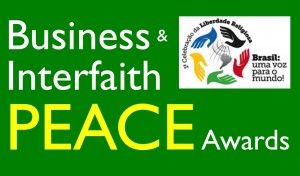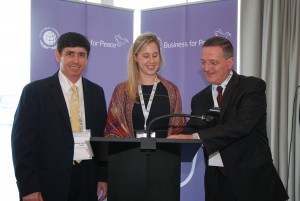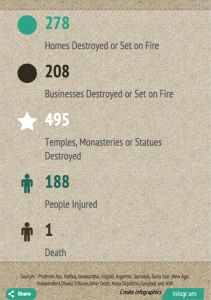 New York – UN Headquarters: The Religious Freedom & Business Foundation, together with its Brazilian Affiliate, signed this week an historic agreement with the United Nations Global Compact’s Business for Peace platform to be co-partners for the global Business & Interfaith Peace Awards to be held biannually in the host cities of the Summer and Winter Olympic Games beginning in Rio de Janeiro in September 2016 during the time period of the Paralympic Games.*
New York – UN Headquarters: The Religious Freedom & Business Foundation, together with its Brazilian Affiliate, signed this week an historic agreement with the United Nations Global Compact’s Business for Peace platform to be co-partners for the global Business & Interfaith Peace Awards to be held biannually in the host cities of the Summer and Winter Olympic Games beginning in Rio de Janeiro in September 2016 during the time period of the Paralympic Games.*
The partners intend to carry forth the biennial awards in the host cities of future Olympic and Paralympic Games, including in PyeongChang, South Korea (2018), and Tokyo, Japan (2020).
Overview of the Business & Interfaith Peace Awards
The Business & Interfaith Peace Awards is a high-profile global initiative that will honor, publicize and highlight business leaders who have demonstrated significant advances and innovations in interfaith understanding and peace in the workplace and community, thereby fostering increased interreligious and intercultural understanding, freedom of religion or belief, and peace.
There will be Gold, Silver and Bronze prizes for leaders of businesses in four categories:
- – Multinational corporations
- – National companies
- – Young, entrepreneurial companies
- – Companies led by women
 Nominees for the Business & Interfaith Peace Awards will come through the Business for Peace network as well as other similar networks. The nominees will be judged by an independent panel of six experts chosen from three separate fields such as corporate social responsibility, freedom of religion or belief, and peace studies (jointly approved by RFBF/ARLN & UNGC/B4P). The committee will be convened by the president of the Religious Freedom & Business Foundation and the president of its Brazilian affiliate, the Associação pela Liberdade Religiosa e Negócios, and a representative of UNGC/B4P.
Nominees for the Business & Interfaith Peace Awards will come through the Business for Peace network as well as other similar networks. The nominees will be judged by an independent panel of six experts chosen from three separate fields such as corporate social responsibility, freedom of religion or belief, and peace studies (jointly approved by RFBF/ARLN & UNGC/B4P). The committee will be convened by the president of the Religious Freedom & Business Foundation and the president of its Brazilian affiliate, the Associação pela Liberdade Religiosa e Negócios, and a representative of UNGC/B4P.
The agreement was signed on 23rd day of June 2015 at United Nations Headquarters in New York City by Melissa Powell, Head, Business for Peace, UNGC, Brian J. Grim, President of the Religious Freedom & Business Foundation, Ricardo Leite, President of the Associação pela Liberdade Religiosa e Negócios (pictured).
Overall Aims of the Partnership
- Promote peaceful and inclusive societies for sustainable development, provide access to justice for all, and build effective, accountable and inclusive institutions at all levels, focusing on engagement with businesses to promote interfaith understanding and peace
- Expand and deepen private sector action in support of interfaith understanding and peace in the workplace, marketplace and local communities
- Help businesses play a central role in sustaining the openness – including interfaith understanding – on which development and prosperity depend
- Advance the implementation of the Ten Principles of the UN Global Compact in challenging operating environments and catalyze collaborative action to advance interfaith understanding and peace
- Through business, unite people under a common objective to come together to advance business goals that include building peace by breaking down barriers between communities, religions and regions
Strategic Outcomes
- Greater awareness among companies of how they can implement the Ten Principles of the UN Global Compact in high-risk and conflict affected areas, focusing on engagement with businesses to promote interfaith understanding and peace
- Greater transparency and disclosure in company contributions to interfaith understanding and peace
- Create a network of businesses and catalyze corporate action and partnerships to support interfaith understanding and peace in the workplace, marketplace, and in local communities
- Enhanced local ownership of B4P through local priorities – learning, dialogue, partnerships – by having a local business in Brazil take the lead on this “Made in Brazil” global initiative
- Increased advocacy and outreach to businesses on interfaith understanding and peace
- Increased capacity, knowledge and thought leadership for businesses on interfaith understanding and peace
According to the Pew Research Center, approximately three-in-four people today (73%) live in countries with high levels of social hostilities involving religion. But, interfaith understanding – and its contribution to peace – is in the interest of business.
Recent research shows that economic growth and global competitiveness are stronger when social hostilities involving religion are low and government respect for, and protection of, the universally recognized human right of freedom of religion or belief is high
Interfaith understanding also strengthens business by reducing corruption and encouraging broader freedoms while also increasing trust and fostering respect. Research shows that laws and practices stifling religion are related to higher levels of corruption. Similarly, freedom of religion or belief highly correlates with the presence of other freedoms and a range of social and economic goods, such as better health care and higher incomes for women.
Positively engaging around the issue of interfaith understanding also helps business to advance trust and respect with consumers, employees and possible partner organizations, which can give companies a competitive advantage as sustainability and ethics come to the forefront of corporate engagement with society.
With the shared vision of a more sustainable and inclusive global economy that delivers lasting benefits to people, communities and markets, it is clear that companies can make significant contributions to advancing interfaith understanding and peace through both core business and outreach activities. The examples in the joint Global Compact Network Indonesia-RFBF-UNGC publication, “Business: A Powerful Force for Supporting Interfaith Understanding and Peace,” offer an important step forward in providing companies with guidance on why and how they can make practical contributions in this area – in ways benefitting both their business and the societies where they operate.
Logistics
The Religious Freedom & Business Foundation and its Brazilian affiliated Association (the “Foundation”) will assume the role and responsibility of orchestrating the logistics of this initiative, including the recruitment of corporate donors and funding.
* The Business & Interfaith Peace Awards are not affiliated with the Olympic or Paralympic Games.



 Sunshine Nut Company was founded in 2011 in Matola, Mozambique, where Don purchased a small existing factory. Over the next several months they renovated the factory and installed new roasting equipment.
Sunshine Nut Company was founded in 2011 in Matola, Mozambique, where Don purchased a small existing factory. Over the next several months they renovated the factory and installed new roasting equipment.

